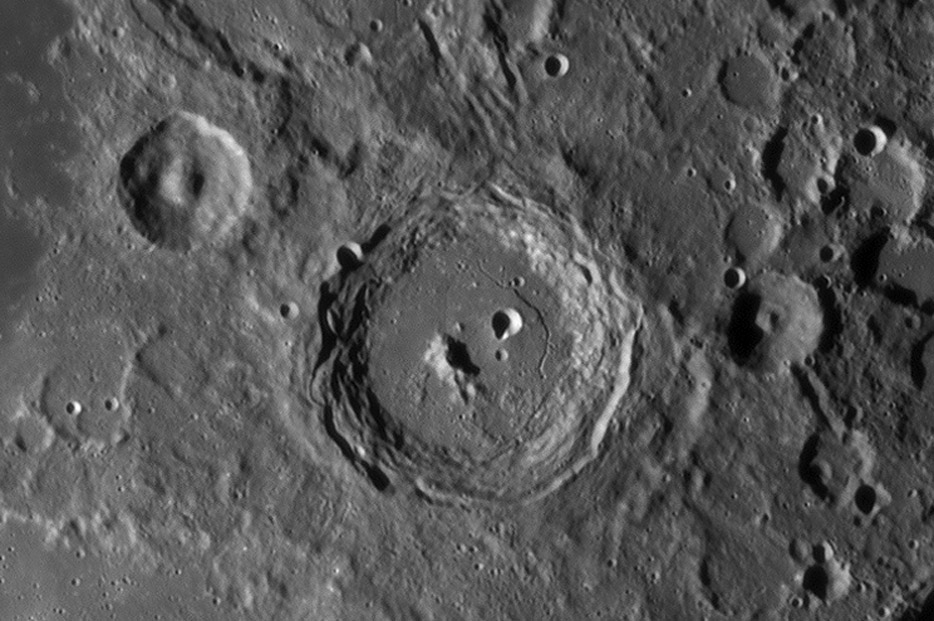Difference between revisions of "March 11, 2010"
| Line 3: | Line 3: | ||
<!-- ws:start:WikiTextHeadingRule:1:<h1> --> | <!-- ws:start:WikiTextHeadingRule:1:<h1> --> | ||
<!-- ws:start:WikiTextLocalImageRule:16:<img src="/file/view/LPOD-Mar11-10.jpg/126700601/LPOD-Mar11-10.jpg" alt="" title="" /> -->[[File:LPOD-Mar11-10.jpg|LPOD-Mar11-10.jpg]]<!-- ws:end:WikiTextLocalImageRule:16 --><br /> | <!-- ws:start:WikiTextLocalImageRule:16:<img src="/file/view/LPOD-Mar11-10.jpg/126700601/LPOD-Mar11-10.jpg" alt="" title="" /> -->[[File:LPOD-Mar11-10.jpg|LPOD-Mar11-10.jpg]]<!-- ws:end:WikiTextLocalImageRule:16 --><br /> | ||
| − | <em>image by [mailto:slamm@blueyonder.co.uk | + | <em>image by [mailto:slamm@blueyonder.co.uk Stefan Lammel]</em><br /> |
<br /> | <br /> | ||
| − | There are three central peaks in this snippet from a [http://www.pbase.com/slammel/image/122040536/original | + | There are three central peaks in this snippet from a [http://www.pbase.com/slammel/image/122040536/original mosaic] from Stefan. The peak in Arzachel, the big crater in the middle, is more or less what we think lunar central peaks should look like, except for being off-center. The peak is a massive mountain, with straight-line wall segments that reach from its summit to the crater floor. It looks sort of rugged, like a mountain should. Contrast that with the odd, rounded central peak filling the floor of [http://the-moon.wikispaces.com/Alpetragius Alpetragius] to the west. And with the somewhat similar rounded peak in [http://the-moon.wikispaces.com/file/detail/Rukl_55_satellites_NE.jpg Parrot C] to the east. Parrot C's peak is not as rounded as Alpet's - which Gerard Kuiper called an egg in a bird's nest - and doesn't fill the floor so completely. In fact, it is the walls of C and Alpet that look most alike. The erosional sequence of walls goes from a sharp rim crest scarp at Arzachel with somewhat rounded terraces, to Alpet where the scarp still exists but the inner wall has been completely erased/smoothed of any evidence to terraces. And C takes this one step further, with the smoothed walls extending al the way to the summit of the crater rim. Are these rounded peaks just the eroded version of a more typical mountainous peak? I don't think so. The Alpet peak is much wider in proportion to the crater floor than most peaks - Arzachel's peak could never be eroded enough to look like it. Perhaps the Alpet peak is the way most central peaks should look. A central peak forms by the rebound of ground zero. It always seemed strange that the rebound would be anything other than a broad upward swell - like the Alpet peak. Maybe we should be asking why most craters have small, non-rounded peaks?<br /> |
<br /> | <br /> | ||
| − | <em>[mailto:tychocrater@yahoo.com | + | <em>[mailto:tychocrater@yahoo.com Chuck Wood]</em><br /> |
<br /> | <br /> | ||
<strong>Technical Details</strong><br /> | <strong>Technical Details</strong><br /> | ||
| Line 16: | Line 16: | ||
<br /> | <br /> | ||
<hr /> | <hr /> | ||
| − | <div>You can support LPOD when you buy any book from Amazon thru [http://www.lpod.org/?page_id=591 | + | <div>You can support LPOD when you buy any book from Amazon thru [http://www.lpod.org/?page_id=591 LPOD!]<br /> |
</div> | </div> | ||
---- | ---- | ||
===COMMENTS?=== | ===COMMENTS?=== | ||
| − | + | Register, and click on the <b>Discussion</b> tab at the top of the page. | |
Revision as of 16:16, 11 January 2015
Peaks & Walls

image by Stefan Lammel
There are three central peaks in this snippet from a mosaic from Stefan. The peak in Arzachel, the big crater in the middle, is more or less what we think lunar central peaks should look like, except for being off-center. The peak is a massive mountain, with straight-line wall segments that reach from its summit to the crater floor. It looks sort of rugged, like a mountain should. Contrast that with the odd, rounded central peak filling the floor of Alpetragius to the west. And with the somewhat similar rounded peak in Parrot C to the east. Parrot C's peak is not as rounded as Alpet's - which Gerard Kuiper called an egg in a bird's nest - and doesn't fill the floor so completely. In fact, it is the walls of C and Alpet that look most alike. The erosional sequence of walls goes from a sharp rim crest scarp at Arzachel with somewhat rounded terraces, to Alpet where the scarp still exists but the inner wall has been completely erased/smoothed of any evidence to terraces. And C takes this one step further, with the smoothed walls extending al the way to the summit of the crater rim. Are these rounded peaks just the eroded version of a more typical mountainous peak? I don't think so. The Alpet peak is much wider in proportion to the crater floor than most peaks - Arzachel's peak could never be eroded enough to look like it. Perhaps the Alpet peak is the way most central peaks should look. A central peak forms by the rebound of ground zero. It always seemed strange that the rebound would be anything other than a broad upward swell - like the Alpet peak. Maybe we should be asking why most craters have small, non-rounded peaks?
Chuck Wood
Technical Details
Aug 12, 2009. 10in f4.8 Newtonian, Infinity 2-1M, 5x Powermate, green filter, 150/3000, Avistack, Registax, PSE5, Focus Magic
Related Links
Rükl plate 55
COMMENTS?
Register, and click on the Discussion tab at the top of the page.



